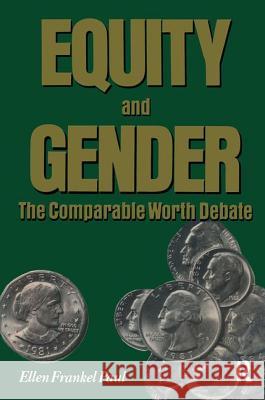Equity and Gender: The Comparable Worth Debate » książka
Equity and Gender: The Comparable Worth Debate
ISBN-13: 9780887387203 / Angielski / Miękka / 1988 / 154 str.
Equity and Gender: The Comparable Worth Debate
ISBN-13: 9780887387203 / Angielski / Miękka / 1988 / 154 str.
(netto: 222,94 VAT: 5%)
Najniższa cena z 30 dni: 216,55
ok. 16-18 dni roboczych.
Darmowa dostawa!
Comparable worth-the idea that women ought to be paid the same wages as men performing comparable although not the same jobs-has generated a firestorm of controversy. This analysis of the comparable worth debate takes up its pros and cons in an extraordinarily disciplined and fair-minded manner. After outlining the debate, Paul attempts to resolve this deeply divisive debate in terms of larger philosophical underpinnings. To do so, she develops a sophisticated analysis of the American economic marketplace as well as the general marketplace of ideas. The volume initially sets forth the case for comparable worth by a wide-ranging review of the difference between the fairness of the marketplace and the demands for wealth redistribution. The author squarely addresses the toughest issues in the comparable worth debate: the persistence of a wage gap; undervaluation of jobs as a result of gender; and social conditioning into subordinate and superordinate roles. She then shifts into an analysis of the essentially economic counter-arguments against the largely social arguments in favor of comparable worth. An exhaustive history of the legislative, judicial, and regulatory history that underlies the comparable worth debate is given exhaustive treatment. Paul concludes with the belief that efforts to replace the market for setting labor and wage priorities would lead to misalignments and misalliances of such severity that calls for more central planning would be the predictable result. Paul shows that for the most part efforts at artificially leveraging wages between men and women would have unanticipated consequences, such as restricting free choice among working people and innovation among entrepreneurs. Professor Paul cites such present advantages as freedom of job entry or the United States' ability to compete in international markets would be early victims in an environment dominated by strong regulation, which for her is at the heart of the comparable worth debate. The author argues that equity is best insured by women entering all areas of the work force from which they have been blocked in the past. To encourage women to enter new and challenging occupations rather than to seek artificial shifts in compensation should be the goal of an equity-oriented society. This volume is not an argument against equity, but against the artificial regulation and control of free economies to the ultimate detriment of women. It should be of great interest to professionals interested in political economy, social policy and planning, and women's studies.











